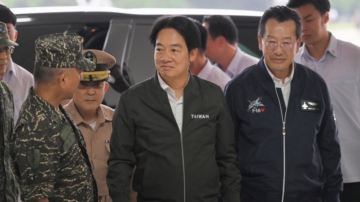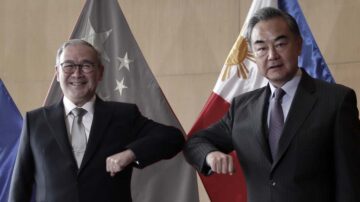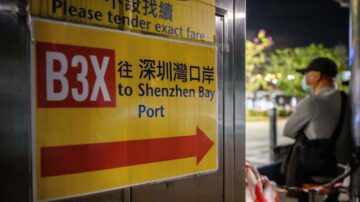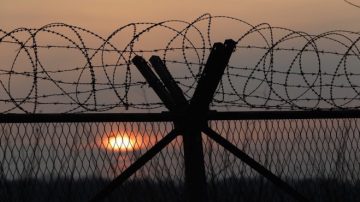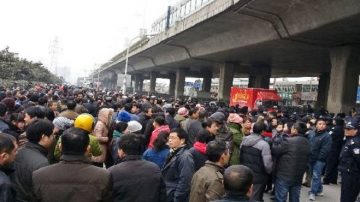【新唐人2013年12月05日訊】美國副總統拜登(Joe Biden)4號抵達北京,進行為期兩天的訪問。據白宮發言人表示,拜登將直接要求中共領導人,撤銷日前劃設的「東海防空識別區」。有媒體認為,拜登在東海問題劍拔弩張的時刻訪華,有助於改善中美關係,但如果硬要華府在美、日盟國關係與美、中關係之間作出選擇,結果只會令中共當局失望。也有媒體指出,由於美國想重返亞太,又和中共有巨大政治和經濟利益關係,拜登此行將致力於安撫日本,並穩住中共。
12月4號,拜登抵京訪問,中共日前劃設的「東海防空識別區」,預料是拜登此行的主要議題。
據香港《蘋果日報》報導,拜登3號與日本首相安倍晉三會面,會後拜登表示,美方強烈反對中共劃設「東海防空識別區」,中共的片面行動已升高地區緊張情勢,增加發生事故和誤判的風險。拜登還表示,將向中方提出識別區問題,並表明美國態度。
白宮發言人卡尼2號也表示,拜登將當面告訴中共領導人,美國不接受中共對新宣佈的防空識別區所作要求的「合法性」,中共有必要撤銷識別區。
不過,北京時政觀察人士華頗認為,中共不可能撤銷識別區。
北京時政觀察人士華頗:「比如對美、日、韓的一些軍機,更多的採取一些監視作用,但是不會一個勁,它也會盡量避免擦槍走火的事情發生。因為中國的問題在於國內,而不在於國外。現在來講,中國和美、日發生衝突,極為不明智。」
據了解,11月23號,中共宣佈在包括中、日爭端的釣魚島上空設立「東海防空識別區,」立即引發日、美、韓等國的不滿,美國B-52轟炸機、韓國軍機和日本自衛隊飛機,不理會中共的「知會」要求,紛紛不予通知進入識別區,公然示威,頓時讓中共成為國際上的笑柄。
而拜登選在此時訪華,《蘋果日報》認為,中共高層自然不會放棄利用美國管控日本的最後努力,由此尋求加強中、美合作、緩和東海局勢,因此,拜登的到訪,大有可能成為東海問題及中、美關係的轉折點。
報導說,事實上,最令北京不滿的,並不是美國轟炸機闖入「東海防空識別區」,而是今年6月,中共新上任的領導人習近平在加州安納伯格莊園,就釣魚臺問題向歐巴馬表達中方立場時被打斷,中方此後多次要求美方保持中立,但都沒有獲得美方的理會。
不過,報導也指出,如果硬要華府在美、日盟國關係與美、中關係之間作出選擇,結果只會令北京失望。
美國中文雜誌《中國事務》總編輯伍凡:「這次拜登在日本的語調不是很高,他在安撫日本,所以,日本心裡也毛毛的,究竟美國打甚麼牌。美國的牌打的是,美國要重返亞太,要平衡中、日之間的關係,也平衡中、美之間的關係,也平衡日、美之間的關係,這是他這次北京訪問的最主要目的之一,我想,兩邊都不想打戰,兩邊有很多共同的利益。」
另據香港《亞洲週刊》引述消息人士的話披露,中共宣佈劃設「東海防空識別區」,背後深藏的意義在於,中國關注的焦點不再只是釣魚島,也不再只是東海中間線的油氣田,而是中國突破第一島鏈的出海口「宮古海峽」。
伍凡:「識別區有兩個目標,近期的目標對著釣魚島,想把它拿下來談判,日本不肯。遠期的目標,突破日、美對中共包圍的第一島鏈,所以它的防空識別區靠近沖繩100多公裡,那裡有個海口宮古島,那是為長期的目標。」
不過,《蘋果日報》評論指出,中共拋出的「防空識別區」,是三中全會成立的「國安委」所點燃的第一把火,既測試軍事、外交、宣傳等部門的協調能力,又驗證成立「國安委」的必要性,也藉此減弱中共黨內外對中共總書記習近平集權的批評。
採訪/易如 編輯/陳潔 後製/陳建銘
Biden Visits China Amid Air Zone Tensions
U.S. Vice President Joe Biden arrived in Beijing
on December 4 for a two-day visit.
White House spokesperson says that Biden will directly
request Chinese leaders to withdraw the "East China Sea
Air Defense Identification Zone (ADIZ)".
Some media outlets say that Biden's visit to China at this
time will help ease tensions between the two countries.
However, if Washington is forced to choose between
Japan and China, the result can be only disappointing
to the Chinese regime.
Other media outlets say that the U.S. wants to return
to Asia-Pacific, as they have huge political and economic
interests in China, and Biden's visit is to placate Japan
and settle China.
On Dec. 4, Biden arrived in Beijing.
The East Sea ADIZ was expected to be
a major topic during Biden's China trip.
According to Hong Kong's Apple Daily, Biden met with
Japanese Prime Minister Shinzo Abe on Dec. 3.
Biden said after the meeting that the U.S. strongly opposed
China's implementation of ADIZ.
The CCP's recent move has raised tension in the area
and increased the risk of an accident and misjudgment.
Biden said that he would raised the issue of ADIZ
and show the U.S.'s attitude.
On Dec. 2, White House spokesman Jay Carney said that
Biden would tell Chinese leaders to their faces that
the U.S. doesn't recognize the legality of China's ADIZ
and "urges China not to implement" it.
Hua Po, Beijing current affairs observer, believes
that China won't withdraw the ADIZ.
Hua Po: "For example, the military aircraft of the U.S.,
Japan and South Korea are used more for monitoring the area.
They try not to fire their guns,
to not let such an incident occur.
China's problem is domestically not externally, and I will say
that it is not wise for China to clash with the U.S. and Japan."
Sources say that the Chinese Communist Party (CCP)
announced on November 23 that the ADIZ over the Diaoyu
Islands aroused immediate dissatisfaction from the U.S.,
Japan, South Korea and other countries.
The fact that U.S. B-52 Bombers, South Korean military
aircraft and Japanese Self-Defense Forces ignored China's
requests, repeatedly entered ADIZ without notice, and openly
protest, suddenly turns the CCP into an international joke.
Regarding Biden's visit to China at this critical moment,
Apple Daily said that the high-level CCP will certainly not
lose the chance to use the U.S. to restrain Japan, to strengthen
cooperation with the U.S., and ease East Sea tensions.
Thus Biden's trip is likely the turning point
for the East Sea dispute and Sino-U.S. relations.
The report said that actually, Beijing's most unhappy issue
is not the U.S. B-52 bomber entering the ADIZ,
it was an incident in June when Xi Jinping visited
the Annenberg Retreat at Sunnylands in the U.S.
When Xi told Obama about China's stance regarding
the Diaoyu Islands issue, their conversation was interrupted.
Since then, China repeatedly requested the U.S.
to stand neutral, however, the U.S. didn't respond.
The report also points out that if the U.S. must make choice
between Japan and China, the result will likely disappoint Beijing.
Wu Fan, chief editor of U.S.-based Chinese magazine
China Affairs: "Biden wasn't talking sharply in Japan.
He was placating Japan.
Thus minds of Japanese leaders didn't settle.
'What side is the U.S. playing?' they wondered.
The U.S. wants to return to Asia-Pacific,
it needs to balance the relations for China and Japan,
to balance relations between China and the U.S.,
and to balance relations between Japan and the U.S.
This is one of Biden's main purposes of visiting Beijing.
I think neither side want to fight, as both sides
have many mutual interests."
Hong Kong's Yazhou Zhoukan magazine cited sources that
said the CCP's announcement of ADIZ has a deep hidden
purpose.
The CCP is no longer just focused on the Diaoyu Islands,
nor on oil fields in middle line of the East Sea,
but on the Miyako Strait, the first chain of Island waterways
for China to access into deep Ocean.
Wu Fan: "ADIZ has two purposes.
First is targeting the Diaoyu Islands.
It wants to possess the islands and attempted to negotiate
but was rejected by Japan.
Second they want to break through the first chain of islands
that are surrounded by the US and Japan.
Thus the ADIZ is 100 kilometers from Okinawa,
at Miyakojima island, that is CCP's long-term target."
Apply Daily said that the CCP's launch of ADIZ
is the National Security Commission's (NSC) first move
since its establishment during the Third Plenum.
It not only tests the cooperation of the military, diplomatic,
propaganda and other sectors, but proves the importance
of setting up the NSC.
It can also have the effect of easing internal criticism
towards Xi Jinping's centralization.
Interview/YiRu Edit/ChenJie Post-Production/ChenJianming
12月4號,拜登抵京訪問,中共日前劃設的「東海防空識別區」,預料是拜登此行的主要議題。
據香港《蘋果日報》報導,拜登3號與日本首相安倍晉三會面,會後拜登表示,美方強烈反對中共劃設「東海防空識別區」,中共的片面行動已升高地區緊張情勢,增加發生事故和誤判的風險。拜登還表示,將向中方提出識別區問題,並表明美國態度。
白宮發言人卡尼2號也表示,拜登將當面告訴中共領導人,美國不接受中共對新宣佈的防空識別區所作要求的「合法性」,中共有必要撤銷識別區。
不過,北京時政觀察人士華頗認為,中共不可能撤銷識別區。
北京時政觀察人士華頗:「比如對美、日、韓的一些軍機,更多的採取一些監視作用,但是不會一個勁,它也會盡量避免擦槍走火的事情發生。因為中國的問題在於國內,而不在於國外。現在來講,中國和美、日發生衝突,極為不明智。」
據了解,11月23號,中共宣佈在包括中、日爭端的釣魚島上空設立「東海防空識別區,」立即引發日、美、韓等國的不滿,美國B-52轟炸機、韓國軍機和日本自衛隊飛機,不理會中共的「知會」要求,紛紛不予通知進入識別區,公然示威,頓時讓中共成為國際上的笑柄。
而拜登選在此時訪華,《蘋果日報》認為,中共高層自然不會放棄利用美國管控日本的最後努力,由此尋求加強中、美合作、緩和東海局勢,因此,拜登的到訪,大有可能成為東海問題及中、美關係的轉折點。
報導說,事實上,最令北京不滿的,並不是美國轟炸機闖入「東海防空識別區」,而是今年6月,中共新上任的領導人習近平在加州安納伯格莊園,就釣魚臺問題向歐巴馬表達中方立場時被打斷,中方此後多次要求美方保持中立,但都沒有獲得美方的理會。
不過,報導也指出,如果硬要華府在美、日盟國關係與美、中關係之間作出選擇,結果只會令北京失望。
美國中文雜誌《中國事務》總編輯伍凡:「這次拜登在日本的語調不是很高,他在安撫日本,所以,日本心裡也毛毛的,究竟美國打甚麼牌。美國的牌打的是,美國要重返亞太,要平衡中、日之間的關係,也平衡中、美之間的關係,也平衡日、美之間的關係,這是他這次北京訪問的最主要目的之一,我想,兩邊都不想打戰,兩邊有很多共同的利益。」
另據香港《亞洲週刊》引述消息人士的話披露,中共宣佈劃設「東海防空識別區」,背後深藏的意義在於,中國關注的焦點不再只是釣魚島,也不再只是東海中間線的油氣田,而是中國突破第一島鏈的出海口「宮古海峽」。
伍凡:「識別區有兩個目標,近期的目標對著釣魚島,想把它拿下來談判,日本不肯。遠期的目標,突破日、美對中共包圍的第一島鏈,所以它的防空識別區靠近沖繩100多公裡,那裡有個海口宮古島,那是為長期的目標。」
不過,《蘋果日報》評論指出,中共拋出的「防空識別區」,是三中全會成立的「國安委」所點燃的第一把火,既測試軍事、外交、宣傳等部門的協調能力,又驗證成立「國安委」的必要性,也藉此減弱中共黨內外對中共總書記習近平集權的批評。
採訪/易如 編輯/陳潔 後製/陳建銘
Biden Visits China Amid Air Zone Tensions
U.S. Vice President Joe Biden arrived in Beijing
on December 4 for a two-day visit.
White House spokesperson says that Biden will directly
request Chinese leaders to withdraw the "East China Sea
Air Defense Identification Zone (ADIZ)".
Some media outlets say that Biden's visit to China at this
time will help ease tensions between the two countries.
However, if Washington is forced to choose between
Japan and China, the result can be only disappointing
to the Chinese regime.
Other media outlets say that the U.S. wants to return
to Asia-Pacific, as they have huge political and economic
interests in China, and Biden's visit is to placate Japan
and settle China.
On Dec. 4, Biden arrived in Beijing.
The East Sea ADIZ was expected to be
a major topic during Biden's China trip.
According to Hong Kong's Apple Daily, Biden met with
Japanese Prime Minister Shinzo Abe on Dec. 3.
Biden said after the meeting that the U.S. strongly opposed
China's implementation of ADIZ.
The CCP's recent move has raised tension in the area
and increased the risk of an accident and misjudgment.
Biden said that he would raised the issue of ADIZ
and show the U.S.'s attitude.
On Dec. 2, White House spokesman Jay Carney said that
Biden would tell Chinese leaders to their faces that
the U.S. doesn't recognize the legality of China's ADIZ
and "urges China not to implement" it.
Hua Po, Beijing current affairs observer, believes
that China won't withdraw the ADIZ.
Hua Po: "For example, the military aircraft of the U.S.,
Japan and South Korea are used more for monitoring the area.
They try not to fire their guns,
to not let such an incident occur.
China's problem is domestically not externally, and I will say
that it is not wise for China to clash with the U.S. and Japan."
Sources say that the Chinese Communist Party (CCP)
announced on November 23 that the ADIZ over the Diaoyu
Islands aroused immediate dissatisfaction from the U.S.,
Japan, South Korea and other countries.
The fact that U.S. B-52 Bombers, South Korean military
aircraft and Japanese Self-Defense Forces ignored China's
requests, repeatedly entered ADIZ without notice, and openly
protest, suddenly turns the CCP into an international joke.
Regarding Biden's visit to China at this critical moment,
Apple Daily said that the high-level CCP will certainly not
lose the chance to use the U.S. to restrain Japan, to strengthen
cooperation with the U.S., and ease East Sea tensions.
Thus Biden's trip is likely the turning point
for the East Sea dispute and Sino-U.S. relations.
The report said that actually, Beijing's most unhappy issue
is not the U.S. B-52 bomber entering the ADIZ,
it was an incident in June when Xi Jinping visited
the Annenberg Retreat at Sunnylands in the U.S.
When Xi told Obama about China's stance regarding
the Diaoyu Islands issue, their conversation was interrupted.
Since then, China repeatedly requested the U.S.
to stand neutral, however, the U.S. didn't respond.
The report also points out that if the U.S. must make choice
between Japan and China, the result will likely disappoint Beijing.
Wu Fan, chief editor of U.S.-based Chinese magazine
China Affairs: "Biden wasn't talking sharply in Japan.
He was placating Japan.
Thus minds of Japanese leaders didn't settle.
'What side is the U.S. playing?' they wondered.
The U.S. wants to return to Asia-Pacific,
it needs to balance the relations for China and Japan,
to balance relations between China and the U.S.,
and to balance relations between Japan and the U.S.
This is one of Biden's main purposes of visiting Beijing.
I think neither side want to fight, as both sides
have many mutual interests."
Hong Kong's Yazhou Zhoukan magazine cited sources that
said the CCP's announcement of ADIZ has a deep hidden
purpose.
The CCP is no longer just focused on the Diaoyu Islands,
nor on oil fields in middle line of the East Sea,
but on the Miyako Strait, the first chain of Island waterways
for China to access into deep Ocean.
Wu Fan: "ADIZ has two purposes.
First is targeting the Diaoyu Islands.
It wants to possess the islands and attempted to negotiate
but was rejected by Japan.
Second they want to break through the first chain of islands
that are surrounded by the US and Japan.
Thus the ADIZ is 100 kilometers from Okinawa,
at Miyakojima island, that is CCP's long-term target."
Apply Daily said that the CCP's launch of ADIZ
is the National Security Commission's (NSC) first move
since its establishment during the Third Plenum.
It not only tests the cooperation of the military, diplomatic,
propaganda and other sectors, but proves the importance
of setting up the NSC.
It can also have the effect of easing internal criticism
towards Xi Jinping's centralization.
Interview/YiRu Edit/ChenJie Post-Production/ChenJianming

